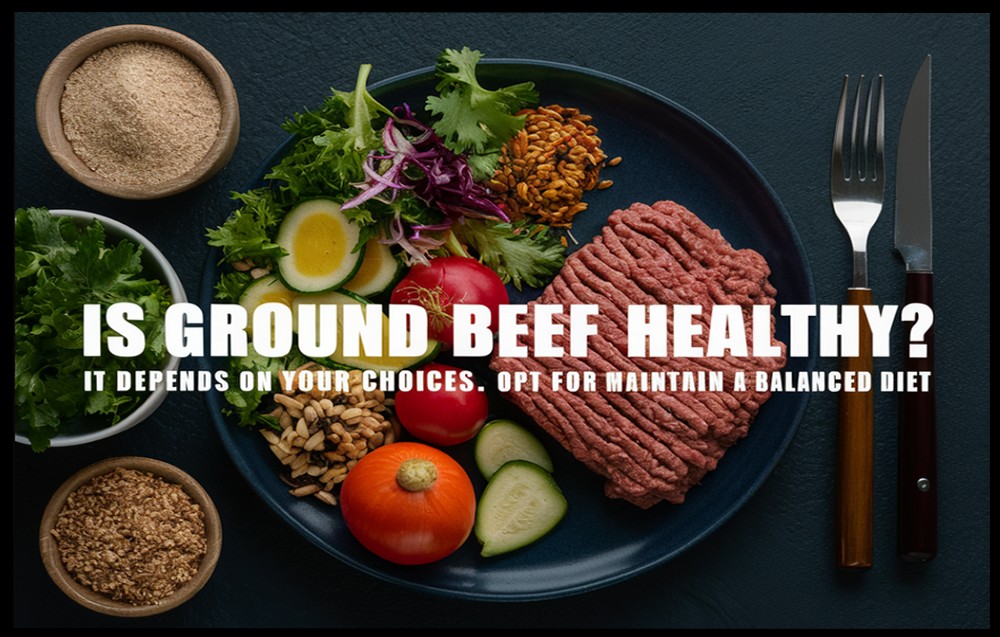Ground beef is a staple in many households, offering versatility in a variety of dishes. However, there’s ongoing debate over whether it’s healthy. In this article, we’ll explore the nutritional benefits and potential risks of ground beef, helping you make informed dietary choices.
Nutritional Profile of Ground Beef
Ground beef is a rich source of protein, crucial for muscle growth and repair. It also provides essential nutrients like:
- Iron: Necessary for oxygen transport in the blood.
- Zinc: Supports immune function and wound healing.
- B Vitamins: Important for energy production and brain health.
However, the nutritional content can vary depending on the fat content. For instance, lean ground beef (90% lean) has less fat and fewer calories than regular ground beef (70% lean). Choosing the right type can help manage dietary fat intake and support overall health.
For more ideas on how to incorporate nutrient-rich ingredients into your diet, explore these easy and healthy meal ideas.
Health Benefits of Ground Beef
When consumed as part of a balanced diet, ground beef can offer several health benefits:
- Muscle Growth: Its high protein content is ideal for maintaining and building muscle.
- Nutrient Density: Ground beef is packed with vital vitamins and minerals, particularly iron and zinc, which are more easily absorbed from animal sources.
- Satiety: The combination of protein and fat helps you feel full longer, which can aid in weight management.
Choosing grass-fed beef can also provide higher levels of omega-3 fatty acids and antioxidants, which are beneficial for heart health.
For more ways to enjoy ground beef, consider this paprika chicken rice bake, which can be adapted with ground beef for a hearty and nutritious meal.
Potential Health Risks of Ground Beef
Despite its benefits, ground beef has potential health risks:
- Saturated Fat and Cholesterol: Ground beef, especially higher-fat varieties, is a significant source of saturated fat, which can raise cholesterol levels and increase the risk of heart disease.
- Cancer Concerns: High consumption of red meat, including ground beef, has been linked to an increased risk of colorectal cancer. The risk is more pronounced with processed meats but is still a consideration with fresh ground beef.
- Kidney Health: Diets high in protein, particularly from red meat, can increase uric acid levels, which may lead to kidney issues over time.
If you’re looking for healthier alternatives, try this chicken marsala recipe, which offers a lower-fat protein option.
Ground Beef vs. Ground Turkey: Which Is Healthier?
For those considering alternatives, comparing ground beef with ground turkey can be insightful:
- Fat Content: Ground turkey, particularly lean cuts, generally contains less fat than ground beef, making it a better choice for heart health.
- Calories: Ground turkey is usually lower in calories, which can benefit those trying to manage their weight.
- Nutritional Value: While both meats provide adequate protein, ground beef tends to be higher in iron and B vitamins.
Ultimately, the choice between ground beef and turkey depends on your individual dietary needs and health goals.
FAQs: Common Questions About Ground Beef
Is Ground Beef Processed Meat?
No, fresh ground beef is not considered processed meat. However, if ground beef has been smoked, cured, or includes preservatives, it would then fall into the processed meat category.
Can Ground Beef Be Part of a Healthy Diet?
Yes, ground beef can be part of a healthy diet when eaten in moderation and prepared healthily. Opting for lean cuts and cooking methods that reduce fat intake, such as grilling or baking, can help you enjoy ground beef while maintaining a balanced diet.
How Often Should I Eat Ground Beef?
Moderation is key. It’s recommended to limit red meat, including ground beef, to a few times a week. Including a variety of protein sources, such as fish, poultry, and plant-based options, can help reduce potential health risks.
What Are Healthier Alternatives to Ground Beef?
Healthier alternatives include ground turkey, chicken, or plant-based proteins like tofu or lentils. These options can be used in many recipes that call for ground beef, providing similar nutritional benefits with lower health risks.
Conclusion: Is Ground Beef Healthy or Not?
Ground beef can be a healthy part of your diet when chosen wisely and eaten in moderation. While it offers valuable nutrients like protein, iron, and B vitamins, it also carries some health risks, particularly related to saturated fat and cholesterol. By selecting leaner cuts and incorporating a variety of protein sources, you can enjoy the benefits of ground beef while minimizing potential risks.
For more recipes that incorporate healthy proteins, visit the Recipes Alyssa website for inspiration.

